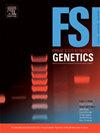警方是否应该使用基因家谱数据库来协助破案?大学生调查
IF 3.1
2区 医学
Q2 GENETICS & HEREDITY
引用次数: 0
摘要
遗传家谱数据库已被执法部门用作在困难的刑事调查中产生线索的新工具。这项技术包括搜索祖先数据库,其中包含自愿上传的DNA,以识别未知嫌疑人的遗传亲属。2018年,臭名昭著的金州杀手使用这种方法被捕,使这些技术的使用进入了公众的视野。然而,公众对执法部门是否应该获得这些信息的看法尚未得到充分研究。本研究以373名大学生为对象,透过网路调查,探讨他们对警方取得遗传家谱的态度。总体而言,学生对调查暴力犯罪(76% %)和侵害儿童犯罪(78% %)的支持程度较高,而对非暴力犯罪(60% %)的不情愿支持程度较低。女性比男性更大支持显示警察访问(p & lt; 0.05)在暴力犯罪的情况下(75年86 %与 %),针对儿童的犯罪(87 % vs 72 %),失踪人口(84 vs 76 % %),并确定人类遗骸(88 vs 78 % %)。18-24岁学生对警察介入暴力犯罪和失踪案件的支持度高于35-50岁学生(p <; 0.05)(85 %比76 %,86 %比72 %)。定性调查结果强调了参与者希望通过授权要求进行监督和保护个人权利,以防止越权,同时允许社会效益。这项研究提供了初步证据,表明受过教育的年轻人认识到警方获得基因谱系的潜在法医价值,但倾向于反映犯罪严重程度的严格规定。这些数据可以为政策辩论和立法框架提供信息,平衡新兴基因技术的效用和伦理。需要对不同人群进行进一步研究,以指导知情的立法。本文章由计算机程序翻译,如有差异,请以英文原文为准。
Should the police use genetic genealogy databases to assist in solving crime? Survey among university students
Genetic genealogy databases have been utilised as a novel tool by law enforcement to generate leads in difficult criminal investigations. This technique involves searching ancestry databases that contain voluntarily uploaded DNA to identify genetic relatives of unknown suspects. The arrest of the notorious Golden State Killer using this method in 2018 brought the use of these techniques into the public eye. However, public perspectives on whether law enforcement should be granted access to this information is understudied. This study explored the attitudes towards police access to genetic genealogy amongst 373 university students through an online survey. Overall, students expressed moderate conditional support, with higher support levels for investigation of violent crimes (76 %) and crimes against children (78 %) compared to reluctant support for non-violent crimes (60 %). Women displayed greater support than men for police access (p < 0.05) in cases of violent crime (86 % vs. 75 %), crimes against children (87 % vs. 72 %), missing persons (84 % vs 76 %), and identifying human remains (88 % vs 78 %). Younger students aged 18–24 exhibited higher support for police access for violent crimes and missing persons cases than older students aged 35–50 (p < 0.05) (85 % vs. 76 %, and 86 % vs. 72 %, respectively). Qualitative findings emphasised participants’ desire for oversight and protecting individual rights through warrant requirements to prevent overreach, whilst allowing societal benefits. This study provides initial evidence that educated young people recognise the potential forensic value of police access to genetic genealogy but favour strict regulations that reflect crime severity. This data can inform policy debates and legislative frameworks, balancing the utility and ethics of emerging genetic technologies. Further research across diverse populations is required to guide well informed legislations.
求助全文
通过发布文献求助,成功后即可免费获取论文全文。
去求助
来源期刊
CiteScore
7.50
自引率
32.30%
发文量
132
审稿时长
11.3 weeks
期刊介绍:
Forensic Science International: Genetics is the premier journal in the field of Forensic Genetics. This branch of Forensic Science can be defined as the application of genetics to human and non-human material (in the sense of a science with the purpose of studying inherited characteristics for the analysis of inter- and intra-specific variations in populations) for the resolution of legal conflicts.
The scope of the journal includes:
Forensic applications of human polymorphism.
Testing of paternity and other family relationships, immigration cases, typing of biological stains and tissues from criminal casework, identification of human remains by DNA testing methodologies.
Description of human polymorphisms of forensic interest, with special interest in DNA polymorphisms.
Autosomal DNA polymorphisms, mini- and microsatellites (or short tandem repeats, STRs), single nucleotide polymorphisms (SNPs), X and Y chromosome polymorphisms, mtDNA polymorphisms, and any other type of DNA variation with potential forensic applications.
Non-human DNA polymorphisms for crime scene investigation.
Population genetics of human polymorphisms of forensic interest.
Population data, especially from DNA polymorphisms of interest for the solution of forensic problems.
DNA typing methodologies and strategies.
Biostatistical methods in forensic genetics.
Evaluation of DNA evidence in forensic problems (such as paternity or immigration cases, criminal casework, identification), classical and new statistical approaches.
Standards in forensic genetics.
Recommendations of regulatory bodies concerning methods, markers, interpretation or strategies or proposals for procedural or technical standards.
Quality control.
Quality control and quality assurance strategies, proficiency testing for DNA typing methodologies.
Criminal DNA databases.
Technical, legal and statistical issues.
General ethical and legal issues related to forensic genetics.

 求助内容:
求助内容: 应助结果提醒方式:
应助结果提醒方式:


